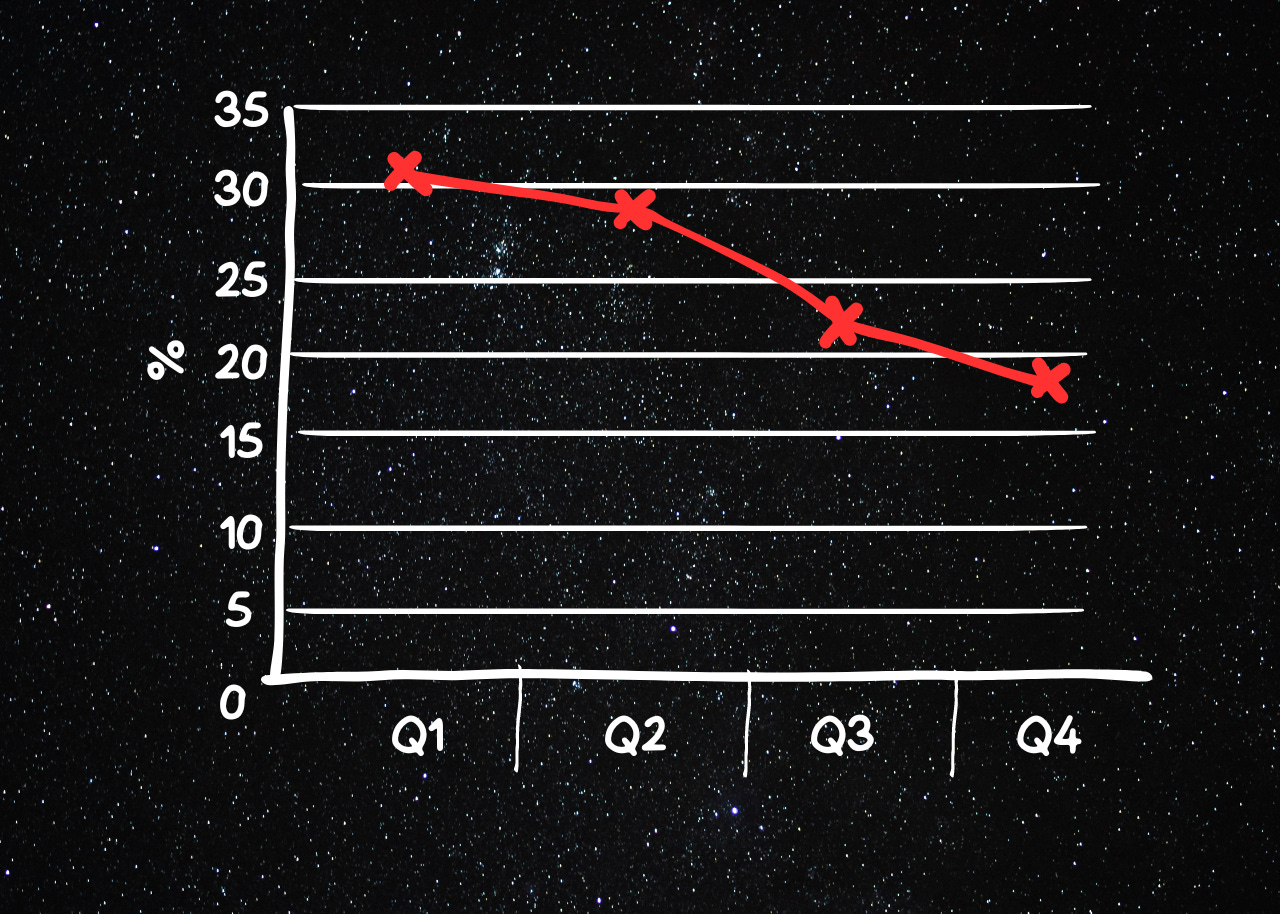🏷️ Categories: Mathematics, Decision making and biases
The world is not under our control.
Our actions influence our outcome, but there are two dice being played in the game and we are only rolling one. We do not know all the factors that explain reality and of those we do know, we do not control them all by a long shot. Sometimes, unsuspected factors make the difference in an inexplicable event.
We only roll one die and we do not even know all the rules of the game.
What month of the year were you born?
I was born in June, it would be harder for me to be a hockey player. Don't you know why?
Players in the top leagues have mostly been born in the first months of the year. This happens because hockey leagues start in winter, so children born in the first months are usually taller and stronger than others of their age, which gives them an advantage in the initial tests. These small biological differences should disappear over the years.
This is not the case, it is just the opposite.
Being the best on the team, they spend more hours on the ice while the others are on the bench, which further increases their chances of becoming professional players (Nolan and Howell, 2010; Sherar et al., 2007; Gladwell, 2008).
If you were born in the last quarter, you are 40% less likely to become a professional.
A condition that you do not control makes the difference.
Which direction was the wind blowing and how high were you?
I'm asking you this because this can make the difference between breaking a world record or not.
In sprint races, such as the 100 and 200 metres, a tailwind gives a significant advantage. So influential is it that the International Association of Athletics Federations (IAAF) states that for a record to be valid, the tailwind must not exceed 2 m/s. Even so, a tailwind of 2 m/s can improve performance in the 100 metres by approximately 0.1 seconds (Barrow, 2012).
If that's not enough, this will shock you, because it continues.
Let's talk about altitude.
Altitude has also been restricted by the federation because of the enormous impact it had. The higher up, the lower the air density (there is less atmospheric pressure), so the friction is less and it is easier to run.
An insignificant detail?
Usain Bolt's men's world record for the 100 metres was 9.69 seconds until Usain himself lowered it to 9.58 seconds.
0.11 seconds less.
If Usain Bolt ran with a tailwind of 2 m/s (and not the 0.7 m/s that he had) and at a maximum altitude of 1000 metres above sea level he could lower it to 9.47 seconds.
He could reduce the record by another 0.11 seconds just because of these details beyond his control.
Insignificant details that make the difference.

A biased perception of an uncontrollable world
Our view of the world and what actually happens are two very different things.
There is an innate tendency in humans to think that their achievements are the exclusive result of their effort and that if other people did not achieve their goals it is because they did not try as hard. It is an explanation consistent with what they observe. If they have obtained better numbers in an exam or in a race they are objectively better.
The problem is that the role that chance plays in that result is being ignored.
The world is uncontrollable. We do not control all the variables of a result.
And yes, of course effort matters, but when we reach high levels of competition, where our abilities have been perfected to the maximum, these details that sometimes escape our control begin to gain importance. Think of 100 or 200 meter sprinters. They all have perfect technique and are among the world's elite. It is in these moments that a gust of favourable wind, a slightly better track or a better mood can make them break a record.
Something as irrelevant as the density of the air, the month of birth or a favourable breeze.
✍️ It's your turn: Do you know of any other cases where this happens? In cycling, the goal is to make bicycles as light and aerodynamic as possible. For an amateur, this means nothing; for a professional, it means being able to win the race.
💭 Quote of the day: "So as not to eliminate free will, I believe it is true that luck is the arbiter of half our actions, but that it still lets us direct the other half." The Prince, Niccolo Machiavelli.
See you soon! Take care 😊.
References 📚
Barrow, J. D. (2012). How Usain Bolt can run faster – Effortlessly. Significance, 9(2), 9-12. https://doi.org/10.1111/j.1740-9713.2012.00552.x
Gladwell, M. (2008). Outliers: The Story of Success. Penguin UK.
Hernández-Gómez, J., Gómez, R., & Couder-Castañeda, C. (2017). Impact of mass gain, tailwind and age on the performance of Usain Bolt from Beijing 2008 to Rio 2016. European Journal Of Physics, 38(5), 054001. https://doi.org/10.1088/1361-6404/aa7ea7
Nolan, J. E., & Howell, G. (2010). Hockey success and birth date: The relative age effect revisited. International Review For The Sociology Of Sport, 45(4), 507-512. https://doi.org/10.1177/1012690210371560
Sherar, L. B., Baxter-Jones, A. D. G., Faulkner, R. A., & Russell, K. W. (2007). Do physical maturity and birth date predict talent in male youth ice hockey players? Journal Of Sports Sciences, 25(8), 879-886. https://doi.org/10.1080/02640410600908001







I was born in September, so thank you for giving me an excuse for not being a success.
I wonder too if there are differences in academic achievement given differences in brain development by age.
One would expect the opposite trend in places in the world where calendars are flipped. Sports seasons in latin america, for example, tend to being in Jan rather than Sept.